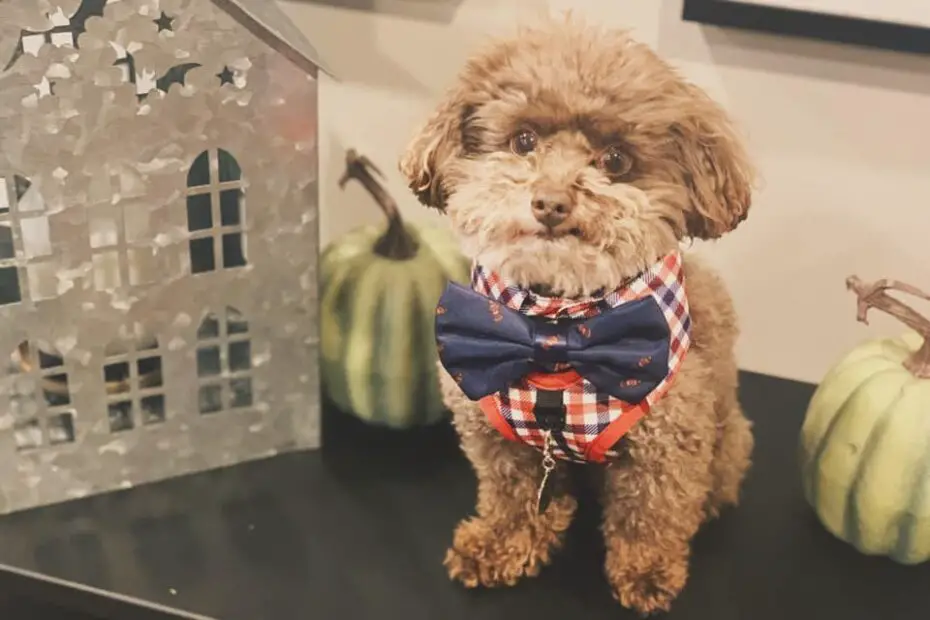Last updated on August 16th, 2021 at 01:00 pm
Toy Poodles: Personality and Temperament
The smallest of the poodles, Toy Poodles stand ten inches or less at the shoulder and only weigh three to six pounds—but there’s a big personality in that small package. Though they’re often stereotyped as lapdogs, Toy Poodles have a lot more to offer than meets the eye. They are spunky, friendly, and always ready to go on an adventure. Toy Poodles thrive on stimulation and attention—they love to play challenging games with their owners or test themselves with puzzle toys. Despite their energetic quirkiness, poodles tend to maintain a dignified and elegant air.
Toy Poodles are patient and calm when they’re well-trained and get sufficient activity. However, they are sensitive dogs and can become anxious if they are lonely. They are highly tuned into their owners’ emotions, and harsh treatment or yelling can cause them great distress. Careful socialization of Toy Poodle puppies is necessary to ensure that they do not develop separation anxiety.
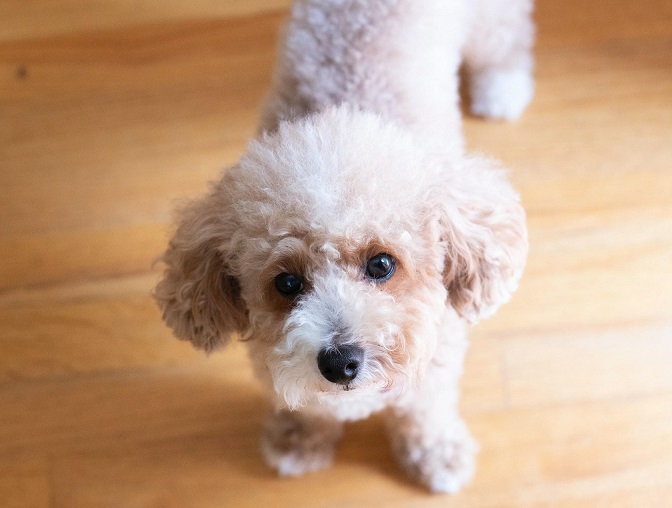
If you’re looking for a dog that will bond closely with you and will always pay close attention to you and your family, a Toy Poodle might be a perfect choice. They are eager to please and see themselves as members of the family. Toy Poodles are always ready to give love to the people they live with. However, they have a powerful protective instinct that can make them uncomfortable with strange visitors.
Some owners will notice that their Toy Poodle barks at people they don’t recognize or is standoffish. However, once they’ve decided that a person is not a threat to their family, Toy Poodles are welcoming and friendly. Already have other pets in the family? That’s no problem—this breed usually gets along well with other dogs and cats.
Are Toy Poodles Smart?
Let’s face it—some dog breeds are smarter than others. And people who don’t know poodles well may assume that they’re not the most intelligent—after all, they look more like celebrity pets than like working animals. But that couldn’t be farther from the truth. Poodle lovers won’t be surprised to learn that the poodle family is the second smartest dog breed (after only Border Collies), according to a study conducted by canine researcher Stanley Coren with the help of many dog obedience judges.
If you spend even a little time around a Toy Poodle, you’ll understand why they rose to the top. Toy Poodles pick up new commands much more quickly than most dogs—research shows that poodles learn new tricks five times faster than an average dog. Perhaps even more importantly, once they’ve learned a command, poodles are roughly 70% more obedient than average dogs. That’s because they are not only fast learners but are also eager to please and less stubborn than many breeds. Those traits combine to make them pleasant pets to live with, particularly for owners who prefer a dog who will reliably obey directions.
That intelligence also suits Toy Poodles to canine sports such as obedience trials, agility, and tracking. And, you may not guess it based on their appearance, but poodles were originally bred as duck hunting dogs adept at retrieving in water, so they’re excellent at swimming and at playing fetch. Since Toy Poodles have high adaptive intelligence, meaning that they independently learn from their surroundings, you may also find that your dog is smart enough to learn how to get into your trash or knows that when you grab your car keys it means you’re about to leave. One thing’s for sure—your Toy Poodle will have no trouble keeping up with your training efforts.
Do Male and Female Toy Poodles Have Different Temperaments?
Male and family Toy Poodles, like all dog breeds, do have some differences in personality.
Male Toy Poodles:
- Will bond with the whole family
- More affectionate and playful
- Easier to housetrain
- Eager to please
- Demand additional attention
Female Toy Poodles:
- Prefer to bond with one person
- Less outwardly affectionate
- More independent
- More protective
- More territorial
Of course, it is important to spay or neuter all pets, and the procedure can reduce aggression and territorial behavior in both male and female dogs. However, in terms of behavior, it is especially essential that you neuter your male Toy Poodle before the age of six months so negative behaviors like territorial marking don’t have a chance to develop.
Are Toy Poodles Good Family Dogs?
With their loyalty and intelligence, Toy Poodles can make excellent family dogs, especially for families interested in training their dogs to do tricks or even to compete in agility or obedience challenges. Toy Poodles are excellent choices for families with allergies since they do not shed and are hypoallergenic.
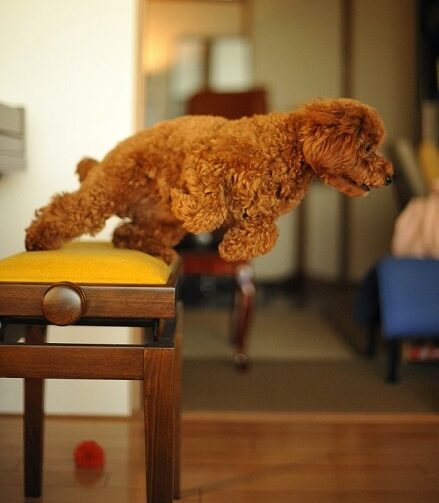
However, Standard Poodles are more typically recommended for families with children since they are less sensitive and less reactive to stimulus. However, a well-trained Toy Poodle and an understanding family can be a match made in heaven.
Since Toy Poodles are a breed that thrives on exercise and challenges, they would be a good match for a family that likes to go for walks or simply to play tag or fetch in the backyard. Toy Poodles are a companion breed that needs plenty of attention and affection, so families considering adding a Toy Poodle to their household should carefully consider how the dog will fit in with their schedules and lifestyle.
Are Toy Poodles Good with Kids?
Toy Poodles are loving family dogs, but they may not be a match for young children. While they are generally gentle and playful with children, Toy Poodles may be more frightened by quick movements or rough handling than a larger dog, which could cause them to react.
Since Toy Poodles are so small, they need to be handled with special care, so it is essential to supervise young children to ensure they do not roughhouse with the dog or put him in danger. For example, dog owners should be sure that a child never hugs the dog tightly or picks him up. A child should only hold a Toy Poodle when the child is sitting on the floor and the dog is either between their legs or in their lap.
Toy Poodles can be a wonderful choice for families with older children, especially those who are respectful and careful around animals and understand that their family dog is more delicate than the larger dogs they know.
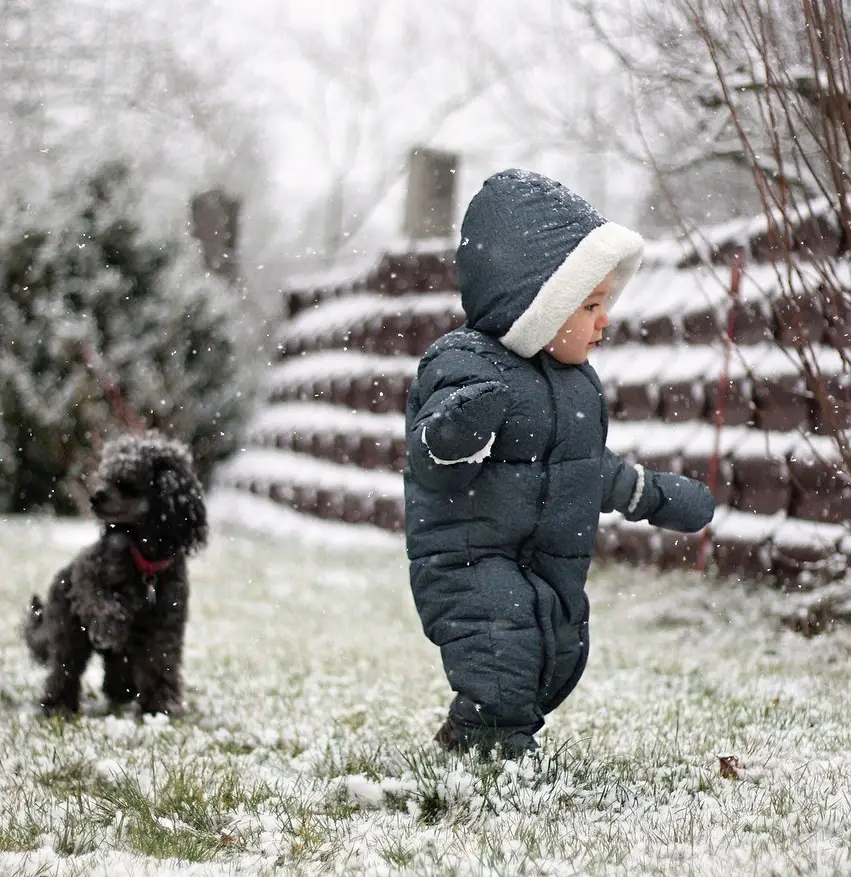
Can You Leave Your Toy Poodle Alone with Your Kid?
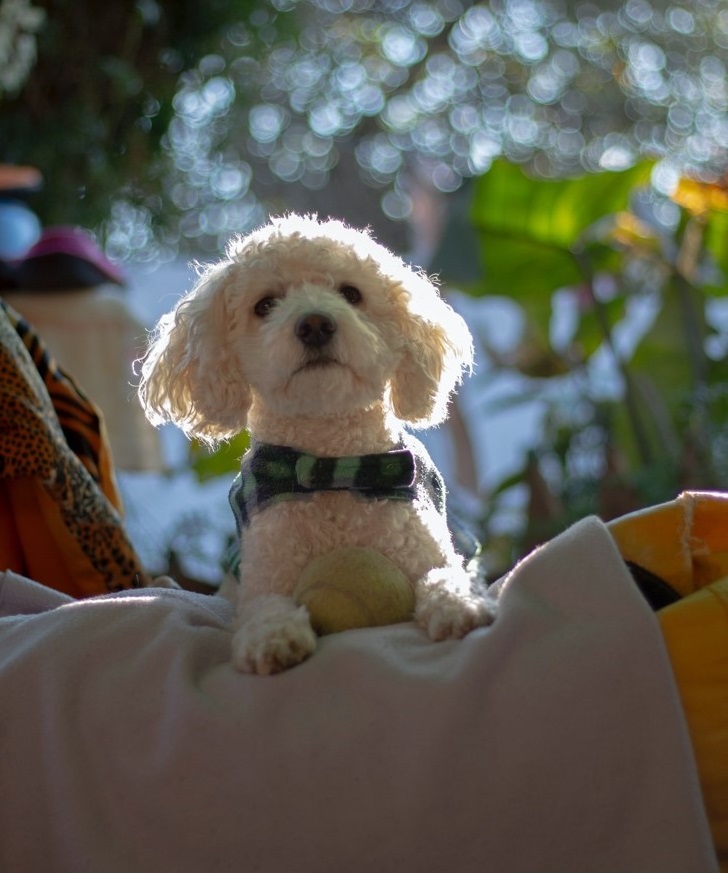
Generally speaking, most young children should not be left alone with any dogs, and that is especially true with Toy Poodles. Their extremely small size puts them at risk of injury if they are handled, picked up, or even dropped by a child.
In fact, toy dog breeds are at especially high risk of broken legs. Since Toy Poodles may also feel anxious around small children, it’s safer for everyone to ensure that children are always supervised around your Toy Poodle.
Older children, who can be trusted to treat the Toy Poodle with care and respect and who can also take care of themselves, should not have problems being alone with the family dog.
How Can You Make Sure Your Toy Poodle and Your Kids Get Along?
Training the family dog is essential—but it’s also important to teach everyone in the family about the right ways to interact with your Toy Poodle.
- Teach your kids how to respectfully greet a dog by squatting or sitting nearby with their hand outstretched and waiting for the dog to come to them.
- Explain that you should never approach a dog too quickly or approach by reaching over their head or back.
- Teach your children to give your dog space when he is eating, sleeping, or in his crate.
- Tell your children that they should never tug on a dog’s hair or tail.
- Explain that Toy Poodles are very delicate and it is important to not squeeze them too tightly or pick them up.
Though these basic instructions are helpful, it’s best to always carefully observe interactions between the dog and your children. That way you can step in if there’s a problem and also keep an eye out for behavior—from your child or your dog—that could become dangerous.
As your Toy Poodle settles in, involve your children in the training process as much as you can. Share the obedience commands and goals you and the dog are learning and ask them to help reinforce them to the dog. You might also consider bringing the children along to a training session, if possible. This will not only help give consistency to the dog but will also help your children become more invested in helping your dog grow.
How Much Living Space Do You Need for a Toy Poodle?
Since Toy Poodles are some of the smallest dogs you’ll find, they don’t require much living space for their bed or crate—and if you snuggle up with your pup on the couch there will still be plenty of room left for you.
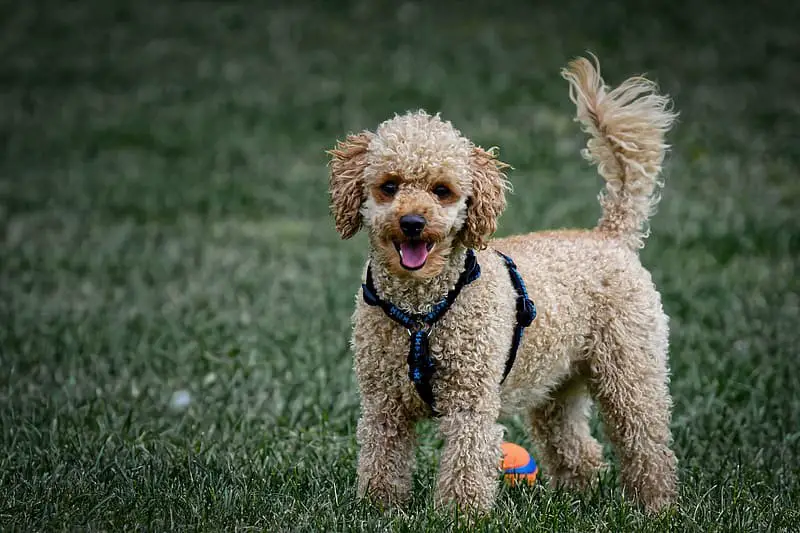
Toy Poodles can fit comfortably even in a small studio apartment and generally don’t need a fenced yard. In fact, they’ll do just fine in an urban environment as long as you make sure they get enough outdoor exercise. Since Toy Poodles are highly energetic and need mental stimulation to avoid boredom, it’s especially important to take them for long walks, bring them to parks, or even take them on car rides to keep them happy and engaged. Bonus points if they get a chance to play with other dogs!
Wherever you live, the most important thing is to ensure that your pup gets enough exercise to keep them happy and healthy. Toy Poodle puppies should receive less prolonged exercise than adults since their muscles, bones, and ligaments are still adjusting. Short bursts of play and quick walks outside are best. Once your Toy Poodle is at least a year old, however, you should aim for at least an hour of walking a day, either as one long walk or in multiple shorter intervals.
Can You Leave A Toy Poodle Alone During the Day?
While many dog owners would prefer to be at home with our pets all day, that’s not an option for most of us. Whether you need to leave for just a few quick errands or for a whole workday, you are likely to need to leave your Toy Poodle at home alone sometimes.
While Toy Poodles have admittedly small bladders, their age tends to determine how long they can last without going to the bathroom. You can still use this rule of thumb: puppies can be left alone for one hour per month they’ve been alive—so your new six-month-old Toy Poodle should be just fine for up to six hours. Of course, elderly Toy Poodles, like all breeds, may need to go out more frequently.
But don’t forget that Toy Poodles are highly social animals. They prefer to be with their people and are prone to loneliness and anxiety when left alone. That anxiety can cause problems like digestive distress and strange behavior. Try leaving your Toy Poodle with a treat puzzle or pulling their favorite rope chew out of the closet for some entertainment while you’re gone. It may also help to leave music or TV playing for ambient noise.
Crate training is also something to consider for Toy Poodle owners who might leave for a few hours at a time. By getting the dog accustomed to seeing the crate as a place of safety, you can train a puppy to self-soothe by going to that space. Be sure that the crate is large enough for your poodle to stand and move around comfortably. Crate training is also a good way to keep an inquisitive puppy from getting into items in your house that could make him sick or cause a mess.
However, crate training does not mean your Toy Poodle will need to go out any less frequently, and dogs should not be left alone in a crate all day. Instead, if you need to be away from your dog longer than is ideal, you should consider setting up a pen using indoor fencing. It should include a bed or comfortable resting area, access to water (and food depending on the time of day), and toys to keep your pup busy.
If you’ll be gone longer than your dog can go without a bathroom break, be sure to arrange for a dog walker or dog sitter to stop by and take him outside. No dog, no matter what age, should be forced to go for more than eight hours without using the bathroom. Of course, if you’re going to travel or be away overnight, it’s very important to find someone to either stay with your dog at your house or bring him to stay with a person you trust. Since Toy Poodles are very sensitive and delicate, it is better to find a dog sitter or a pet hotel and only use a boarding kennel if absolutely necessary.
Since Toy Poodles are prone to developing separation anxiety, it’s also important to pay attention to the way you interact with your dog when you’re leaving and returning the house. Of course, we’re all sad to leave our pups as we head out and happy to see them when we return, but for their sake, we need to keep those feelings inside.
When you leave for the day:
- Act natural—don’t make a production of saying goodbye.
- Don’t interact with your dog right before you leave. Get some quality playtime in an hour or so before instead.
- Be sure that your dog has been outside recently (within the half-hour before you leave) and has plenty of water available.
- Consider leaving an interactive toy, like a Kong with peanut butter or kibble inside, to distract your pup as he adjusts to your absence.
- If your dog is getting anxious when you get dressed or put on your shoes in the morning, occasionally do that routine but stay home and play with your dog so he won’t think that shoes or a coat always mean that you’re leaving.
When you come home:
- Stay calm and quiet. Do not shriek at your dog or immediately run toward him. Some dog trainers recommend that you wait five minutes after getting home to give your dog attention.
- If your dog is barking or jumping on you, ignore him until he calms down. Turn your back to the dog and do not yell at him or push him away.
- If your dog reacts through nervous or submissive behavior, like peeing at your feet, it’s also important to ignore him for a few minutes so he doesn’t perceive you as a threat.
- Once your dog has calmed down and is behaving well, you can reward him with calm pats and attention.
Do Toy Poodles Bark A Lot?
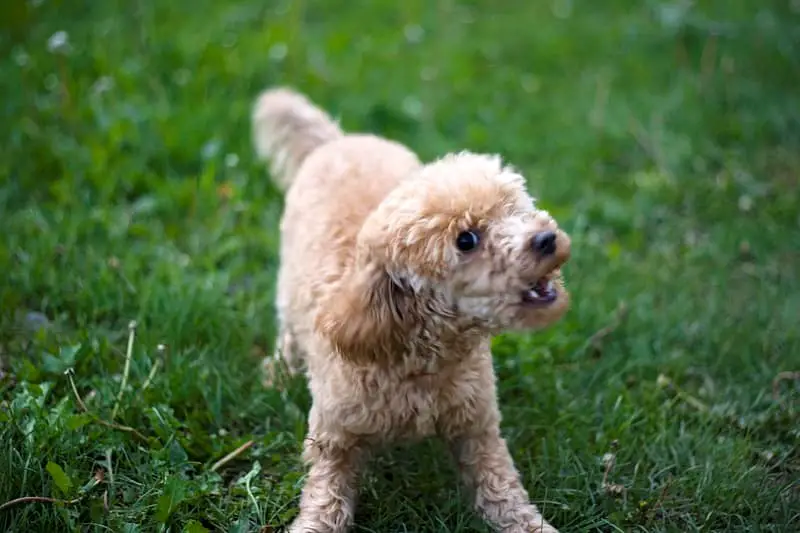
Since Toy Poodles are very sensitive to their environments, they can tend to bark a lot if they see or smell something unusual. Visitors to the house, for example, can set off barking, particularly if your Toy Poodle feels like he or his family is threatened.
While some Toy Poodles are more anxious than others and more prone to barking, the breed overall is not known for being quiet. However, Toy Poodles bark for many of the same reasons as other breeds:
- Anxiety about a stranger or a surprising noise
- Boredom or loneliness
- Excess energy
- Excitement
Luckily, since Toy Poodles are so smart, it’s fairly easy to train them not to bark excessively. There are several different methods to do so, but the most important thing to keep in mind is to never yell at your Toy Poodle when he barks. That will most likely only get him more wound up—and he may even think you’re joining in. Instead, ignore your pup until he calms down.
Of course, it’s also a good idea to think about why your poodle is barking. Does he need more play or exercise? Sometimes simply making sure your dog has enough activity each day to tire him out will calm him out and reduce noise.
How Easy Is It to Travel with Toy Poodles?
Since Toy Poodles are so small, it’s easier to travel with them than with many larger dog breeds. As long as they are well trained and you are careful to keep them safe and healthy, they can be a wonderful travel companion.

If you plan to travel with your Toy Poodle by car, start by getting him used to shorter drives. For safety, it’s always a good idea to use a dog seat belt, or even a dog booster seat with a seat belt if your dog enjoys looking out the window.

If you’re going for a long drive, make sure to stop at least every couple of hours so the dog can use the bathroom. Be sure to give him a chance to drink water at these stops, since letting him drink while you’re driving can be tricky. Some dogs get carsick—there are treatments for that, but be sure to speak to your veterinarian before giving your Toy Poodle any medications, as small dogs need to be treated with special care.
Unlike larger dogs, Toy Poodles are small enough to fit under the seat in front of you if you travel by plane. Since traveling in the cabin is safer for pups, this is good news for dog owners. Even so, it’s important to carefully choose a dog carrier that is approved by your airline and that fits your dog comfortably. Most airlines recommend soft-sided carriers. Let your dog spend time in the carrier before you travel to reduce anxiety.
Whether you’re staying in a dog-friendly hotel, at a rental house, or with friends or family, do your best to make your dog feel at home. Be sure to bring a supply of the food your dog is used to, as well as a favorite toy and even a bed if possible.
One final tip for traveling with a dog? Make sure you have copies of vaccination records as well as information about any medical conditions they may have or medications they need to take.
Five Ways to Adapt Your Lifestyle for a Toy Poodle
While Toy Poodles are loveable dogs and excellent pets, some lifestyle adjustments are always necessary when you add an animal to your family. Here are a few tips:
- Try to get on a regular schedule. Toy Poodles thrive on a routine and will do best if they can expect what time they’ll get fed and taken for walks each day. And you’ll probably need to get up earlier in the morning than you’d like to take them outside!
- Plan ahead. Staying out late for drinks after a full workday requires more planning if you have a dog at home that needs to be taken care of. You’ll need to plan outings farther in advance so you can set a plan for dog care.
- Save for expenses. Toy Poodles, like all dogs, can come with surprise expenses like vet bills—not to mention the daily costs of food, toys, and extra care. Make sure you save with your dog in mind and consider purchasing pet insurance.
- Build outside time into your life. Your Toy Poodle will need a lot of exercise, preferably outside. That may mean you have less time to relax or watch TV, but you’ll probably also get healthier as a result.
- Dog-proof your home. Toy Poodles can get into all sorts of mischief when you’re not looking, especially if you get a puppy. Make sure that dangerous items like electrical cords, cleaning supplies, and medication are out of reach. Check that you don’t have any plants in your house that are poisonous to dogs. And, of course, make sure you don’t leave human food in their reach!
Toy Poodles come with a lot of responsibility and work, but if you’re ready to add one to your family, you’re sure to be rewarded with an entertaining and playful companion and unconditional love.
